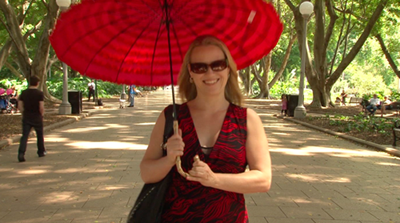Sex and the disability –
touching tale hits festival’s silver screen
Posted on May 17, 2011

IT’S not often that an elderly couple would make up their son’s bed with satin sheets and spread rose petals in readiness for a visit by a sex worker.
But this is no ordinary birthday celebration for Mark, who has cerebral palsy. and yearns for an intimate relationship despite being confined to a wheelchair. Mark speaks via an electronic communication board but his eyes light up at the prospect of an overnight liaison with Rachel Wotton, a Sydney sex worker with 17 years experience.
The liberating, unexpectedly romantic encounter, features in independent director Catherine Scott’s insightful and touching documentary, Scarlet Road. It centres on Wotton’s tireless campaigning for the rights of sex workers and for people with disabilities who are typically perceived as asexual or not in the dating game.
Scarlet Road is among the films vying for the Foxtel Australian Documentary Prize at this year’s Sydney Film Festival in June. ‘‘Representation of sex workers and people with disabilities is a minefield but I wanted to tackle stereotypes head on,’’ says Scott who befriended Wotton a decade ago and gained the trust to take her handheld camera behind closed doors.
‘‘The documentary is positive and pro-active about two marginalised groups,’’ Wotton says. ‘‘Sex workers are everywhere and they come in all shapes and sizes. They are not these isolated, lonely or damaged figures but people who go the the supermarket and lead ordinary lives. The joy of the documentary is that we get to talk about giving pleasure and shining a light on an issue that people haven’t thought about.’’
Wotton, who has a background in psychology and is studying for a master’s degree in sexual health, has become highly specialised in working with clients with cerebral palsy, multiple sclerosis and those with degenerative conditions. One of her clients, John, was diagnosed with multiple sclerosis 26 years ago. A chin-controlled wheelchair affords him mobility but he insists that his sessions with Rachel have enabled him to regain some body movement and improved his self-esteem.
‘‘It’s amazing to see John’s progress. We are always being taught to look after our bodies, to eat the right things but everyone deserves to be touched, to be hugged and shown tenderness.

Wotton expects that Scarlet Road will become a useful tool in educating people from all walks of life about a subject that is too often shrouded in mystery and taboo. For several years she has been part of an international movement to try to gain rights for sex workers and to eradicate the social stigma and discrimination surrounding her chosen occupation.
Thoughtful and articulate, Wotton says that she still keeps in touch with Mark and that he has since celebrated another birthday since the documentary was made.
‘‘It’s a great privilege that the clients trust me and ultimately it’s about treating them with dignity and respect, and having fun. I would love for sex workers to be included in rehabilitation programs if they so chose. It’s about empowering people to make decisions in their life that make them happier and healthier.’’
Wotton hopes that Scarlet Road will shatter myths and prejudices. ‘‘I’ve put in the hard yards of activism and lobbying to fight for the human and legal rights of sex workers. After all the voluntary work with Touching Base [a charitable institution established in 2000] it would be great to get funding to further bridge the gap between people with disability, their support organisations and the sex industry.’’
Scarlet Road, produced by Pat Fiske, screens at the Sydney Film Festival, on Saturday June 11. The screening will be accompanied by a Q&A with guest film-makers.
Bryce Hallett, May 11, 2011